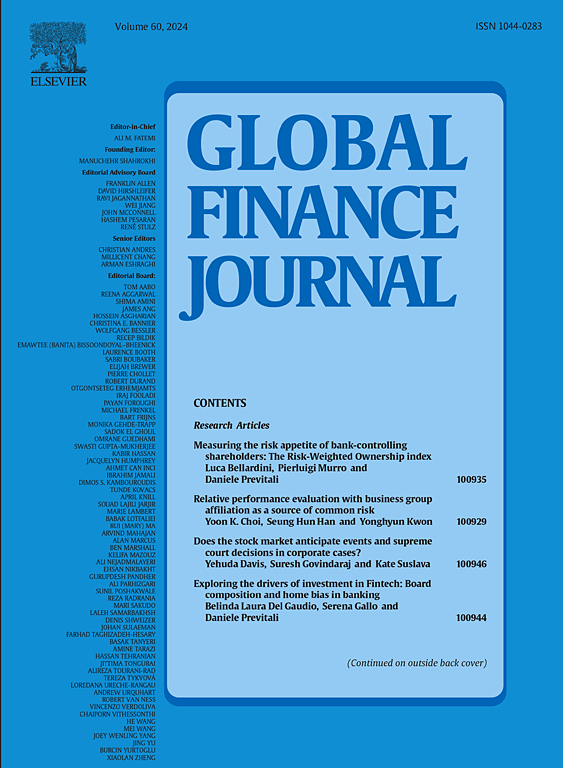Does stock liquidity matter for corporate cash holdings? Insights from a transition economy
IF 5.5
2区 经济学
Q1 BUSINESS, FINANCE
引用次数: 0
Abstract
This research examined the impact of corporate stock liquidity on cash holdings in Vietnam, spanning 2010 to 2020. Our results reveal that higher stock liquidity engenders lower corporate cash holdings. This effect holds after using diverse measurements of stock liquidity and econometric techniques for endogeneity. Most strikingly, we leveraged an exogenous shock to stock liquidity resulting from a variety of Vietnamese legal adjustments in the fields of finance, accounting, and investment in 2015. Our primary results diverge from preceding findings in developed markets and support the conventional notion that corporate managers tend to reduce cash holdings when they forecast that there is a reduction in external financing costs due to increased stock liquidity. Deeper analyses disclose that the stock liquidity–cash holdings nexus is substantially dominated by firm attributes, namely the firm investment degrees and cash dividend paid levels. Notably, industrial manufacturing firms with high stock liquidity have been less precautionary in cash storage management from 2015 onwards. Furthermore, our findings reveal the modulating role of large foreign block-holders on the stock liquidity–corporate cash holdings relationship from 2015 onwards. In a nutshell, our paper offers valuable insights into the association of stock liquidity and corporate cash holdings in the unique context of a transition economy.

股票流动性对公司现金持有量有影响吗?转型经济的启示
本研究考察了越南公司股票流动性对现金持有量的影响,时间跨度为2010年至2020年。我们的研究结果表明,较高的股票流动性导致较低的企业现金持有量。在使用不同的股票流动性测量和内生性计量经济技术后,这种效应成立。最引人注目的是,我们利用了越南2015年在金融、会计和投资领域的各种法律调整对股票流动性造成的外生冲击。我们的主要结果与之前在发达市场的发现不同,并支持传统观念,即当公司经理预测由于股票流动性增加而导致外部融资成本降低时,他们倾向于减少现金持有量。进一步的分析表明,股票流动性-现金持有量关系实质上是由企业属性主导的,即企业投资程度和现金股利支付水平。值得注意的是,自2015年以来,股票流动性较高的工业制造企业在现金储存管理方面的预防性措施有所减少。此外,我们的研究结果揭示了2015年以来大型外资大股东对股票流动性-公司现金持有关系的调节作用。简而言之,我们的论文为股票流动性和企业现金持有量在转型经济的独特背景下的关系提供了有价值的见解。
本文章由计算机程序翻译,如有差异,请以英文原文为准。
求助全文
约1分钟内获得全文
求助全文
来源期刊

Global Finance Journal
BUSINESS, FINANCE-
CiteScore
7.30
自引率
13.50%
发文量
106
审稿时长
53 days
期刊介绍:
Global Finance Journal provides a forum for the exchange of ideas and techniques among academicians and practitioners and, thereby, advances applied research in global financial management. Global Finance Journal publishes original, creative, scholarly research that integrates theory and practice and addresses a readership in both business and academia. Articles reflecting pragmatic research are sought in areas such as financial management, investment, banking and financial services, accounting, and taxation. Global Finance Journal welcomes contributions from scholars in both the business and academic community and encourages collaborative research from this broad base worldwide.
 求助内容:
求助内容: 应助结果提醒方式:
应助结果提醒方式:


